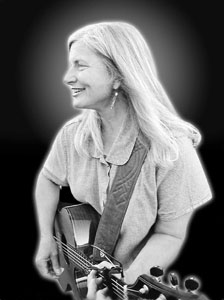![[Metroactive Music]](/music/gifs/music468.gif)
[ Music Index | Santa Cruz Week | SantaCruz Home | Archives ]
Don't Stop Believing
Songwriters hold on to that feel-a-yee-yang at Zelda's Songwriter's Showcase
By Mike Connor
In 1981, Journey's Steve Perry, Jonathan Cain and Neal Schon collaborated to write what is considered by some to be the greatest song in the history of rock music. Granted, "Don't Stop Believing" never made it above No. 9 on the Billboard pop charts, but the song has since earned an honor of even higher distinction. In 2002, Vice Magazine named Journey's "Don't Stop Believing" the penultimate coke jam of all time, rightfully claiming that "it's the most complete use of every single second of recorded music and it's impossible to fight off the urge to do some double-fisted pumps at every chorus. If everyone listened to 'Don't Stop Believing,' it would be a drug-free, bad-attitude-free world."
Such is the power of good songwriting, and the folks behind Zelda's Songwriter's Showcase are doing what they can to encourage more of it. Every Tuesday night (except Dec. 28) from now until the end of January, 10 songwriters get 12 minutes each to strut their stuff in front of an audience and the judges, hoping to win one of eight prizes, ranging from a $35 gift certificate to Zelda's to a gift certificate for 10 hours of free studio time at M.A.R.S. Studios.
Unlike your average "battle of the bands" in which performance is key, this showcase, now in its third year, honors only the songwriting--the musical content, the lyrical content and how the two aspects work together in the composition as a whole--thereby leveling the playing field for less experienced performers.
"I think a lot of songwriters are stepping through some fear to get on that stage and put their songs out there," says Noel Murphy, a songwriter thus afflicted with the jitters, but who so enjoyed participating in the contest that he took on hosting duties this year. Also a veteran of the famed Second City school of improv in Chicago, Murphy goes above and beyond the call of duty, serenading the audience with cover songs during breaks and entertaining with impromptu jams and jokes that he describes as a "mild form of Tourette's." So who are the celebrity judges that intimidated even a pro like Murphy?
Being nothing if not opinionated, we here at Metro Santa Cruz have been participating in the judging over the past three years, along with local notables like songwriter David Beaudry, KPIG DJ Uncle Sherman and drummer-about-town Jimmy Norris.
Admittedly, we've seen our fair share of underdeveloped talent fumbling through lyrical clichés and tired minor-chord progressions over the years, but we've seen just as many genuinely promising acts coming out of the woodwork, surprising us with their clever turns of phrase and catchy hooks. On one occasion, the honorable judge Norris was compelled to address all the contestants before the results were delivered, expressing how diminished he felt to have to pick and choose among such a talented group of songwriters.
See? We're not such a bad lot.
Some Will Win, Some Will Lose
"Whatever you think of the Bee-Gees, they saw songwriting as a 40-hour work week," says Murphy, contrasting that anecdote with one about James Taylor writing "Fire and Rain" in 10 minutes--the point being that guys with high-pitched voices have to work harder to write a hit song. Which raises another important question: What's a hit song? And the simple answer, of course, is that it's popular. Sure, it helps if the song is well-written, has a catchy chorus, an interesting bridge, blah, blah, blah. But production and distribution matter a lot, too, which is where songwriting ends and the game of the music biz begins. Enter Ken Capitanich, owner of M.A.R.S. recording studio and co-owner of K&H Records, and the mastermind behind the Songwriter's Showcase.
"The first showcase we did was in the late '80s at Zelda's; we did two or three of them back then," recalls Capitanich. "I was basically doing it as a promotional thing [for the studio], and it's a good way of making direct contact with artists, to meet people and have them participate in this competition and actually give them studio time."
Recognizing that a lot of talented artists just didn't have the resources to produce a quality album, Capitanich and his friend Herb Smith came up with a solution.
"We started a record company to help fund people. Now we have a motive for doing this--if we find somebody really exceptional or unique, we like to offer them a record contract. It's a better way of doing it than hanging out in all these bars and traveling a lot. This way they come to you."
Calling all small-town girls and city boys: win or lose, never, ever stop believing.
Copyright © Metro Publishing Inc. Maintained by Boulevards New Media.
For more information about Santa Cruz, visit santacruz.com.
![]()

There Can Be Only One: Sherry Austin was the winner of last year's Songwriter's Showcase at Zelda's.
To register for the Songwriter's Showcase, call Ken Capitanich at 831.688.4849 or visit www.zeldassongwritershowcase.com for more info.
From the November 24-December 1, 2004 issue of Metro Santa Cruz.